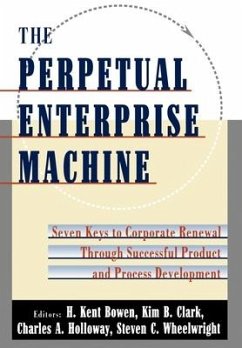U.S. manufacturing is today in a critical period. As a consequence of new global competitors, changes in technologies, and significant shifts in national priorities, our manufacturing base has shrunk alarmingly and thousands of manufacturing jobs have been lost. To address this problem, a unique team was formed called the Manufacturing Vision Group, which included members from five major companies (Chaparral Steel, DEC, Ford Motor Company, Hewlett-Packard, and Eastman Kodak) and four major universities (Harvard, MIT, Purdue, and Stanford). In The Perpetual Enterprise Machine, this group argues that the development project is the vehicle to change a firm's products, processes, and capabilities in order to compete successfully in today's dynamic business environment. The manufacturer that can execute successful projects - leading to new products and processes - will be the one that prospers in the years ahead. Projects become the mechanism for growth and learning for successful firms. The Perpetual Enterprise Machine outlines seven critical elements that outstanding development projects have in common, principles that can be powerful engines of success for the manufacturer facing the challenges of today's fiercely competitive environment. Successful firms recognize and nurture their core capabilities, which are uniquely defined by their hardware, software, and humanware systems and which are crucial to the success of projects. A guiding vision, shared by all members of the cross-functional teams has three levels of specificity. They push the performance envelope, using the immediate project goals to also push the company's capabilities along other dimensions (such as process technology).They have leadership, someone who can navigate uncertain terrain, who sees the project's essential elements from beginning to end, creating integrity in the project and its outcome. They instill the team with a sense of ownership and commitment, linking their personal success, status, and esteem to accomplishing project goals. They use multiple forms of prototyping to learn rapidly and reduce mistakes and misunderstandings. And they integrate within projects, approaching individual tasks in terms of a system-wide solution. Throughout the book, the Manufacturing Vision Group illustrates these seven principles with real life case histories. We see the story behind Kodak's development of the FunSaver camera (done on a unique CAD/CAM system that greatly helped integration and shortened the lead time from design to production); Fords 1991 Crown Victoria, the first project launched under its Concept-to-Customer system; Chaparral Steels development of the worlds first horizontal steel caster; and Hewlett-Packard's wildly successful DeskJet printer. The Perpetual Enterprise Machine delivers the insights of some of the top minds from industry and academia on one of the primary concerns of American business - how to revitalize our manufacturing industries. Visionary - yet engaging and immediately accessible - it gives managers the opportunity to profit from the trials and triumphs of five major corporations, and helps them shape the kinds of projects that will thrive and prosper in the years ahead.








